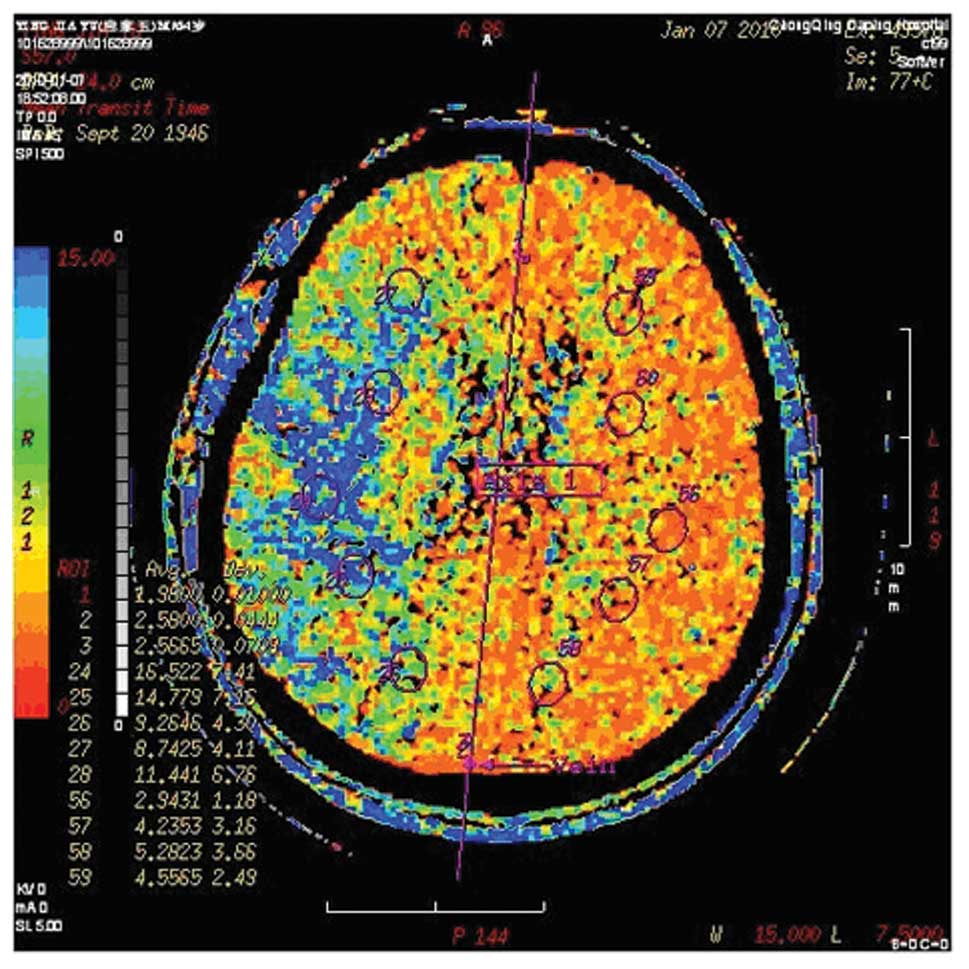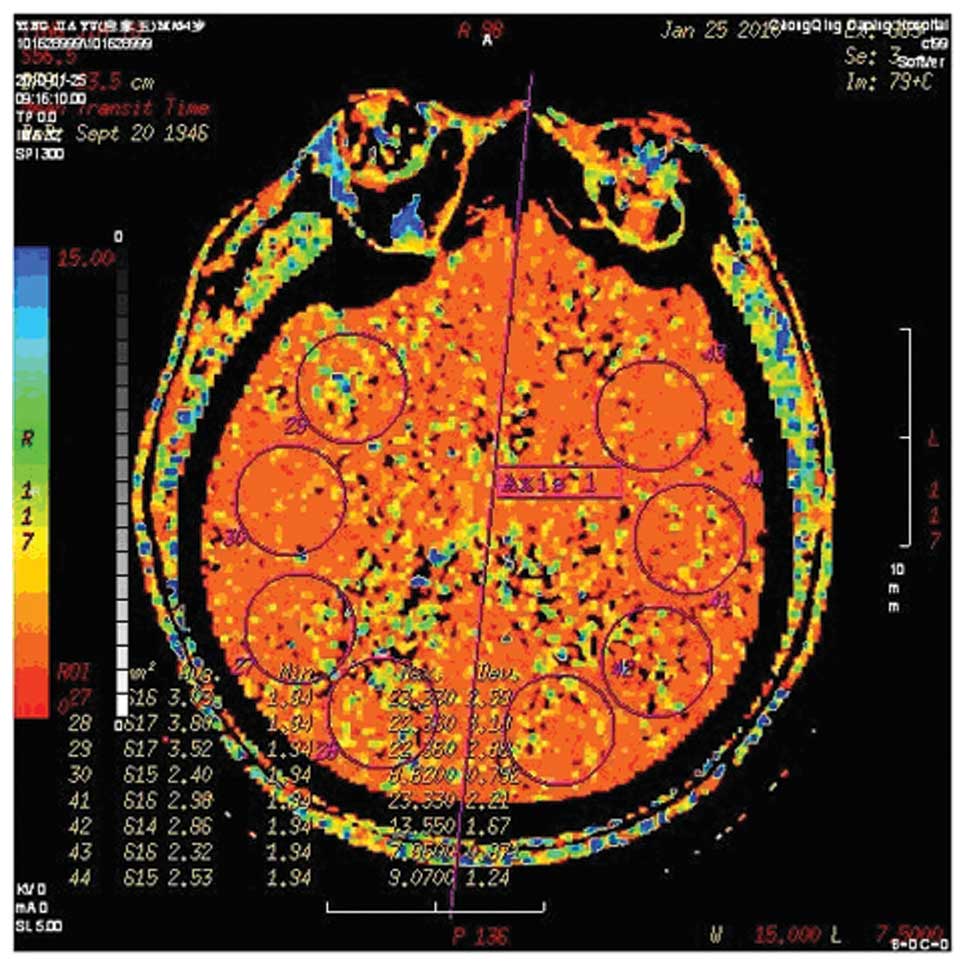|
1
|
Li J, Wang YJ, Zhang M, et al: Vascular
risk factors promote conversion from mild cognitive impairment to
Alzheimer disease. Neurology. 76:1485–1491. 2011. View Article : Google Scholar : PubMed/NCBI
|
|
2
|
Silvestrini M, Viticchi G, Falsetti L, et
al: The role of carotid atherosclerosis in Alzheimer’s disease
progression. J Alzheimers Dis. 25:719–726. 2011.
|
|
3
|
Fergenbaum JH, Bruce S, Spence JD, et al:
Carotid atherosclerosis and a reduced likelihood for lowered
cognitive performance in a Canadian First Nations population.
Neuroepidemiology. 33:321–328. 2009. View Article : Google Scholar : PubMed/NCBI
|
|
4
|
Paulson GW, Kapp J and Cook W: Dementia
associated with bilateral carotid artery disease. Geriatrics.
21:159–166. 1996.
|
|
5
|
Meyer JS, Okayasu H, Tachibana H, et al:
Stable xenon CT CBF measurements in prevalent cerebrovascular
disorders (stroke). Stroke. 15:80–90. 1984. View Article : Google Scholar : PubMed/NCBI
|
|
6
|
Tatemichi TK, Desmond DW, Pronhovnik I, et
al: Dementia associated with bilateral carotid occlusions:
neuropsychological and haemodynamic course after extracranial to
intracranial bypass surgery. J Neurol Neurosurg Psychiatry.
58:633–636. 1995. View Article : Google Scholar
|
|
7
|
Goessens BM, Visseren FL, Kappelle LJ, et
al: Asymptomatic carotid artery stenosis and the risk of new
vascular events in patients with manifest arterial disease. The
SMART Study. Stroke. 38:1470–1475. 2007. View Article : Google Scholar : PubMed/NCBI
|
|
8
|
North American Symptomatic Carotid
Endarterectomy Trial Collaborators: Beneficial effect of carotid
endarterectomy in symptomatic patients with highgrade stenosis. N
Engl J Med. 325:445–453. 1991. View Article : Google Scholar : PubMed/NCBI
|
|
9
|
Safian RD, Bresnahan JF, Jaff MR, et al:
Protected carotid stenting in high-risk patients with severe
carotid artery stenosis. J Am Coll Cardiol. 47:2384–2389. 2006.
View Article : Google Scholar : PubMed/NCBI
|
|
10
|
Zahn R, Ischinger T, Hochadel M, et al:
Carotid artery stenting in octogenarians: results from the ALKK
Carotid Artery Stent (CAS) Registry. Eur Heart J. 28:370–375. 2007.
View Article : Google Scholar : PubMed/NCBI
|
|
11
|
De Rango P, Caso V, Leys D, et al: The
role of carotid artery stenting and carotid endarterectomy in
cognitive performance: a systematic review. Stroke. 39:3116–3127.
2008.PubMed/NCBI
|
|
12
|
Ghogawala Z, Westerveld M and Amin-Hanjani
S: Cognitive outcomes after carotid revascularization: the role of
cerebral emboli and hypoperfusion. Neurosurgery. 62:385–395. 2008.
View Article : Google Scholar : PubMed/NCBI
|
|
13
|
Rothwell PM, Eliasziw M, Gutnikov SA, et
al: Analysis of pooled data from the randomised controlled trials
of endarterectomy for symptomatic carotid stenosis. Lancet.
361:107–116. 2003. View Article : Google Scholar : PubMed/NCBI
|
|
14
|
Brott T, Adams HP Jr, Olinger CP, et al:
Measurements of acute cerebral infarction: a clinical examination
scale. Stroke. 20:864–870. 1989. View Article : Google Scholar : PubMed/NCBI
|
|
15
|
Zhou H, Deng J, Li J, et al: Study of the
relationship between cigarette smoking, alcohol drinking and
cognitive impairment among elderly people in China. Age Ageing.
32:205–210. 2003. View Article : Google Scholar : PubMed/NCBI
|
|
16
|
Zhou DH, Wang JY, Li J, et al: Study on
frequency and predictors of dementia after ischemic stroke: the
Chongqing stroke study. J Neurol. 251:421–427. 2004. View Article : Google Scholar : PubMed/NCBI
|
|
17
|
Kørner A, Lauritzen L, Abelskov K, et al:
The Geriatric Depression Scale and the Cornell Scale for Depression
in Dementia: a validity study. Nord J Psychiatry. 60:360–364.
2006.
|
|
18
|
Pendlebury ST, Cuthbertson FC, Welch SJ,
et al: Underestimation of cognitive impairment by Mini-Mental State
Examination versus the Montreal Cognitive Assessment in patients
with transient ischemic attack and stroke: a population-based
study. Stroke. 41:1290–1293. 2010. View Article : Google Scholar
|
|
19
|
Fuld PA, Masur DM, Blau AD, et al:
Object-memory evaluation for prospective detection of dementia in
normal functioning elderly: predictive and normative data. J Clin
Exp Neuropsychol. 12:520–528. 1990. View Article : Google Scholar : PubMed/NCBI
|
|
20
|
Zhang M: Prevalence study on dementia and
Alzheimer disease. Zhonghua Yi Xue Za Zhi. 70:424–428. 4301990.(In
Chinese).
|
|
21
|
Welsh KA, Butters N, Hughes JP, et al:
Detection and staging of dementia in Alzheimer’s disease. Use of
the neuropsychological measures developed for the Consortium to
Establish a Registry for Alzheimer’s Disease. Arch Neurol.
49:448–452. 1992.
|
|
22
|
Petersen RC, Smith GE, Waring SC, et al:
Mild cognitive impairment: clinical characterization and outcome.
Arch Neurol. 56:303–308. 1999. View Article : Google Scholar : PubMed/NCBI
|
|
23
|
Palmer K, Di Iulio F, Varsi AE, et al:
Neuropsychiatric predictors of progression from amnestic-mild
cognitive impairment to Alzheimer’s disease: the role of depression
and apathy. J Alzheimers Dis. 20:175–183. 2010.PubMed/NCBI
|
|
24
|
Van MW, Rennenberg RJ, Schurink GW, et al:
Cerebral hyper-perfusion syndrome. J Lancet Neurol. 4:877–888.
2005. View Article : Google Scholar : PubMed/NCBI
|
|
25
|
Lin MS, Chiu MJ, Wu YW, et al:
Neurocognitive improvement after carotid artery stenting in
patients with chronic internal carotid artery occlusion and
cerebral ischemia. Stroke. 42:2850–2854. 2011. View Article : Google Scholar
|
|
26
|
Ferri CP, Prince M, Brayne C, et al:
Global prevalence of dementia: a Delphi consensus study. Lancet.
366:2112–2117. 2005. View Article : Google Scholar : PubMed/NCBI
|
|
27
|
Morris JC, Storandt M, Miller JP, et al:
Mild cognitive impairment represents early-stage Alzheimer disease.
Arch Neurol. 58:397–405. 2001. View Article : Google Scholar : PubMed/NCBI
|
|
28
|
Mathiesen EB, Weterloo K, Joakimsen O, et
al: Reduced neuro-psychological test performance in asymptomatic
carotid stenosis: The Tromsø study. Neurology. 62:695–701.
2004.PubMed/NCBI
|
|
29
|
Johnston SC, O’Meara ES, Manolio TA, et
al: Cognitive impairment and decline are associated with carotid
artery disease in patients without clinically evident
cerebrovascular disease. Ann Intern Med. 140:237–247. 2004.
View Article : Google Scholar
|
|
30
|
Rao R: The role of carotid stenosis in
vascular cognitive impairment. J Neurol Sci. 203–204:103–107.
2002.
|
|
31
|
Bates ER, Babb JD, Casey DE, et al:
ACCF/SCAI/SVMB/SCR/ASITN 2007 clinical expert consensus document on
carotid stenting: a report of the American college of cardiology
foundation task force on clinical expert consensus documents. J Am
Coll Cardiol. 49:126–170. 2007. View Article : Google Scholar : PubMed/NCBI
|
|
32
|
Zahn R, Ischinger T, Hochadel M, et al:
Carotid artery stenting in octogenarians: results from the ALKK
Carotid Artery Stent (CAS) Registry. Eur Heart J. 28:370–375. 2007.
View Article : Google Scholar : PubMed/NCBI
|
|
33
|
Cremonesi A, Setacci C, Biqnamini A, et
al: Carotid artery stenting: first consensus document of the
ICCS-SPREAD Joint Committee. Stroke. 37:2400–2409. 2006. View Article : Google Scholar : PubMed/NCBI
|
|
34
|
Altinbas A, van Zandvoort MJ, van den Berg
E, et al: Cognition after carotid endarterectomy or stenting: a
randomized comparison. Neurology. 77:1084–1890. 2011. View Article : Google Scholar : PubMed/NCBI
|
|
35
|
Crawley F, Stygall J, Lunn S, et al:
Comparison of microembolism detected by transcranial Doppler and
neuropsychological sequelae of carotid surgery and percutaneous
transluminal angioplasty. Stroke. 31:1329–1334. 2003. View Article : Google Scholar
|
|
36
|
Grunwald IQ, Supprian T, Politi M, et al:
Cognitive changes after carotid artery stenting. Neuroradiology.
48:319–323. 2006. View Article : Google Scholar : PubMed/NCBI
|
|
37
|
Braekken SK, Reinvang I, Russell D, et al:
Association between intraoperative cerebral microembolic signals
and postoperative neuropsychological deficit: comparison between
patients with cardiac valve replacement and patients with coronary
artery bypass grafting. J Neurol Neurosurg Psychiatry. 65:573–576.
1998. View Article : Google Scholar
|
|
38
|
Sylivris S, Levi C, Matalanis G, et al:
Pattern and significance of cerebral microemboli during coronary
artery bypass grafting. Ann Thorac Surg. 66:1674–1678. 1998.
View Article : Google Scholar : PubMed/NCBI
|
|
39
|
Heyer EJ, Sharma R, Rampersad A, et al: A
controlled prospective study of neuropsychological dysfunction
following carotid endarterectomy. Arch Neurol. 59:217–222. 2002.
View Article : Google Scholar : PubMed/NCBI
|
















